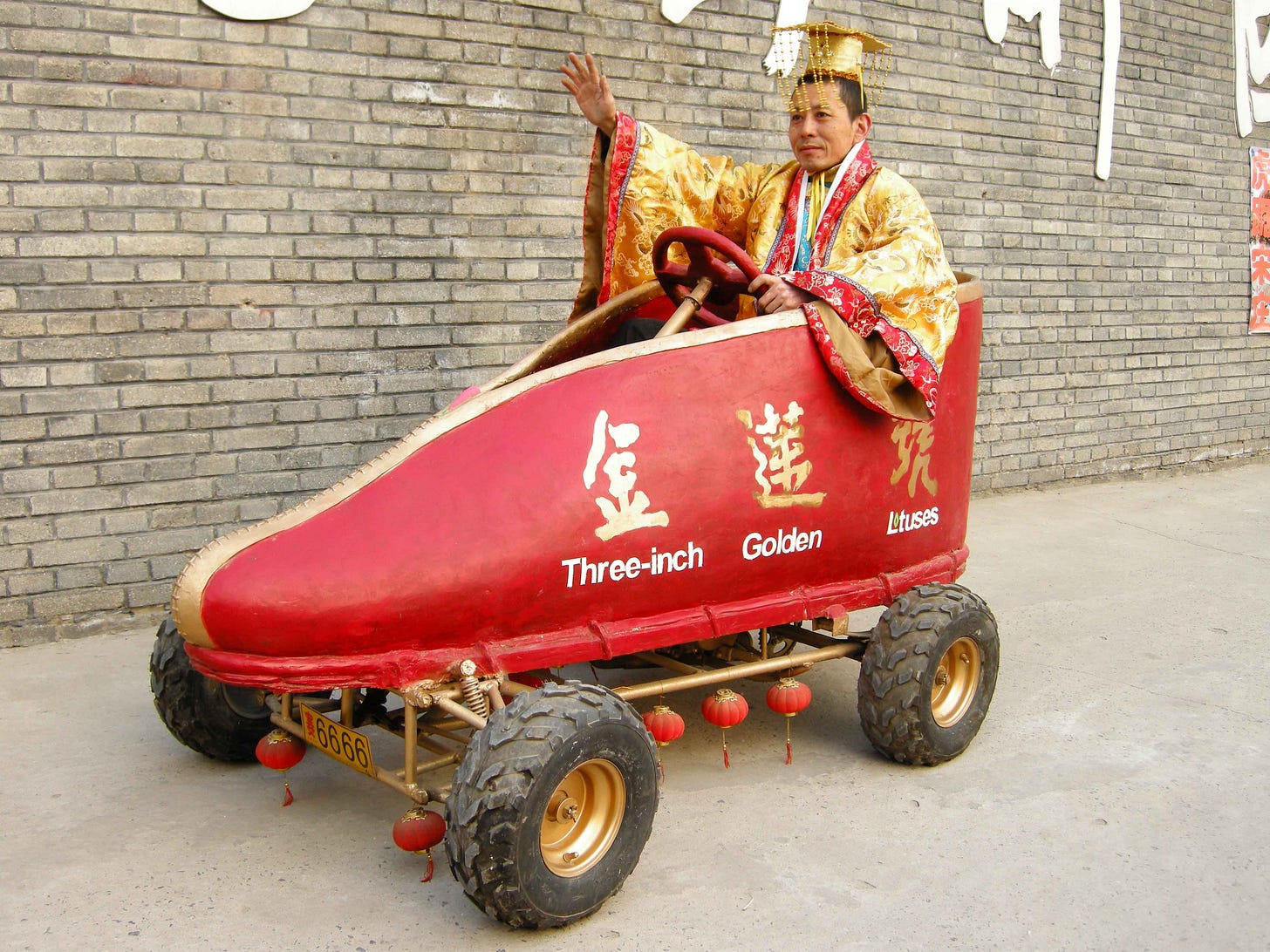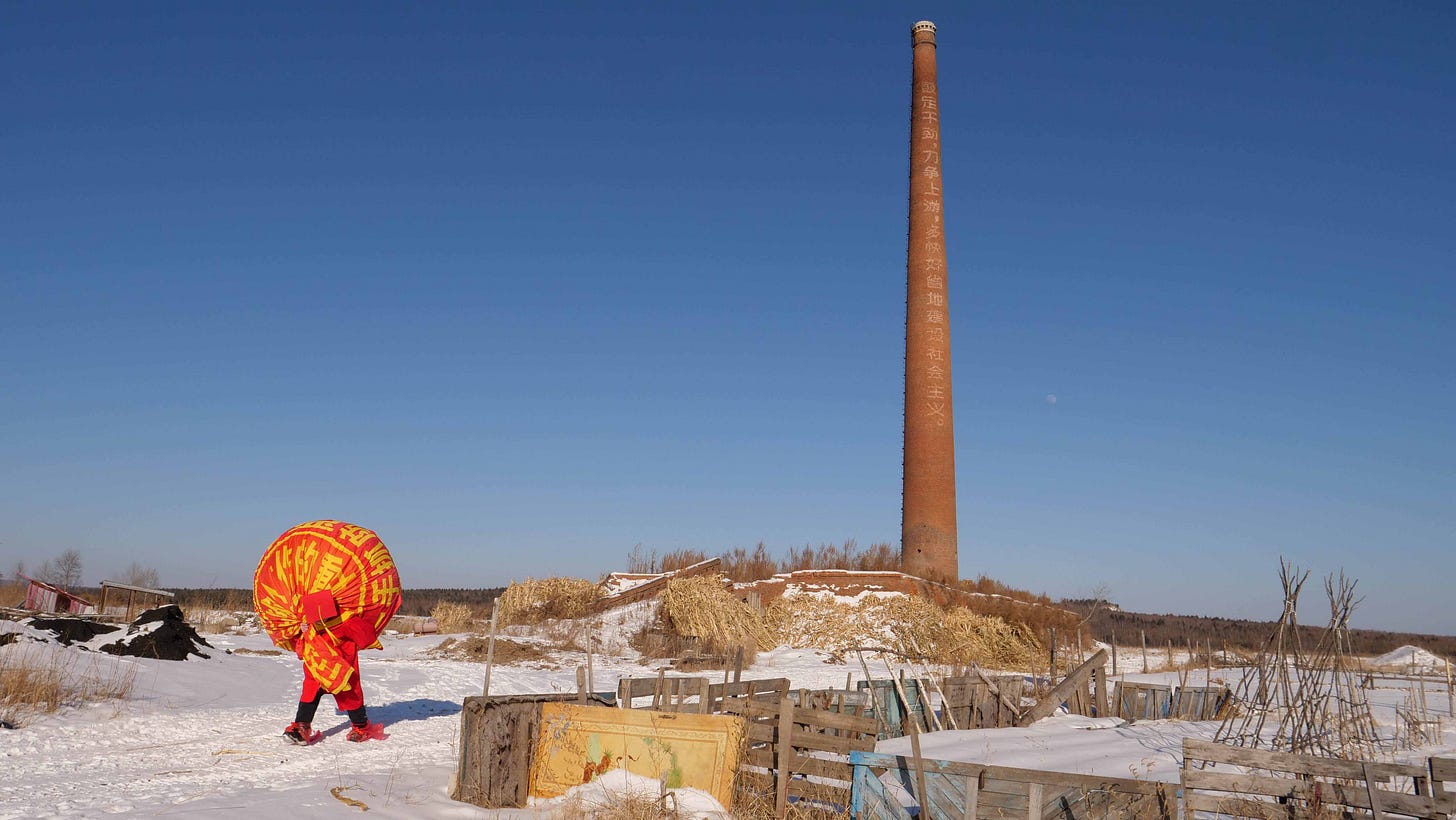(En français ici)
It is an honour to introduce you to my friend, Li Wake, multi-faceted, multi-disciplined, multi-media artist.
A number of contemporary Chinese artists have gravitated towards the West, but Wake has remained in China, and his work therefore springs from his Chinese perspective and is layered with Chinese symbolism and childhood experiences. Curious, I asked him today why he has never ventured to the West? (The reply is translated by Bai, his partner.)
“There are two reasons: no opportunity and no money.
In China, artists who paint traditional paintings have good incomes, such as ink paintings and those who paint beautiful commercial paintings. These paintings and art forms are very beautiful, but they are rarely thoughtful and play a more decorative role. This kind of art is the most popular. Just like Chinese movies, movies with high box office are just fun and entertaining. If films directed by Terayama Shuji, Fellini, Tarkovsky and other film masters were shown in Chinese theaters, no one would watch them. Moreover, thoughtful and critical films cannot pass the censorship of the State Administration of Radio Film and Television.
Bai: Wake’s artistic creations, including painting, film, performance art, etc., have no market in China. He also often feels lonely and confused. I also tried to persuade Wake to paint some beautiful commercial paintings for money, but when he painted these paintings, he made it clear that his heart was very painful. He said that this type of painting is very empty, seriously inconsistent with his reality, and also inconsistent with his childhood experience….I didn't understand at first. Later, I remembered when I was a child, my adoptive father asked me to speak nice words to please the rich, in order to get some benefits (because my family was poor). I hated this feeling of ingratiating others. Now I somewhat understand Wake's feeling. If you force a person to do something he doesn't like, that feeling is really terrible…A fish trapped in a swamp, if it doesn't face its real situation, but revels in the fantasy of the beautiful sea in the distance. Then this way of avoiding life is an illusion.
Interestingly, after reflecting on this, I did some research on Ai Weiwei, famed artist and friend of Wake’s, who now lives in the UK. He told Simon Hattenstone, writing for The Guardian last year: “He thinks his days as an artist may be coming to an end. For 15 years, he adds, the world has treated his work with respect, and that is never good for creativity. “I almost don’t think of myself as artist now,” he says. “My curiosity is getting less and less. The art culture institutions say, ‘Oh, Weiwei have a show next year with us.’ I’m suddenly very privileged, but now I’m getting tired.”
Li Wake began creating during the 80s,
a time which coincided with the communist leader Deng Xioping’s post-Mao economic reforms and opening up to the West. Informal art groups were creating experimental works and “displayed innovative readymade assemblages, installations and collaborations, introducing Chinese audiences and artists to major trends in contemporary Western art, including the breaking of aesthetic and conceptual boundaries, thus motivating artists away from deeply embedded modes of thinking and art-making” (Performance Art in China, by Tan Adele.)
He is also an Iggy Popesque-energised-doppelgänger, and finally a celebrated drinkster. “From my early teens, I had to drink strong alcohol in order to be able to talk to people. In order to get the alcohol to work quickly, I would drink without eating food, and would just talk and sob to my fellow drinkers about my youthful misery that I wanted to talk about before drinking, but was afraid to. They called my drinking parties "fish belly white" because they often lasted from day to night and from night to dawn.”
December 2020, The Chinese Independent Film Archive (CIFA) at Newcastle University
screened Wake’s semi-autobiographical film in December 2020 - The Crack. “The film tells the coming of age of art student Xiangyang, from childhood to middle age. Using a personal and semi-autobiographical style of storytelling it reflects on the fate of Chinese society from the Cultural Revolution to the 1990s, through which runs the thread of a boy experiencing sexual enlightenment and hormonal release in his passage from adolescence to youth”. (CIFA)
Filmed in 35mm, and only having been screened four times in China due to the sensitive subject matter, it has finally found it’s new life after twenty years of waiting in the can. This has been only made possible with the help of Zhu Rikun, founder of Fanhall Studio and promoter of Chinese independent film , and in collaboration with film scholars: Sabrina Qiong Yu, Yu Huiming, Feng Yu, Li Zixiao, and Newcastle University, UK. (Full review of The Crack here)
In the same year Wake’s photographic work Meteorology was presented at the prestigious 2020 Pingyao International Photography Festival.
In 2019 he created a series of Golden Wedding oil paintings and Running Snail inflatable artworks.
In 2018 his short film which he calls a filmic performance piece, National Anthem, was given the “Award of Merit” at the Canadian International Short Film Festival.
Somewhere in between he found time to move from one side of China to the other with his collection of hundreds of books and his young partner, Bai.
Meeting Wake
We met one wet windy afternoon in winter at the Qingdao International Film Festival, 2015, an event which draws filmmakers from all over China, staged over a few days. I had only just arrived in Qingdao, as this was my first term as a teacher at the Beijing Film Academy Modern Creative Media College. I was finding my way, still hot on nerves, and racking my soul to find ‘my people’. It was Yuan who saved me, literally. Our Canadian friend and filmmaker, Tao Gu, introduced us, and despite obstacles to our communication and age, she became the other CHINA for me. Bright, daring, brilliant and young. So very young. She steered me to her world which lay outside my peripheral vision.
There, in the dull light of the projection room, was Li Wake - Yuan’s friend.
Before I continue, I have to explain that there are types of cinephile in China. The IMAX, popcorn lovers who watch box office/online commercial successes like Sacrifice. And then there are the independent filmmakers. ‘In China, the concept of independent cinema is considerably more complex’ says Li Yang, professor of film theory, Beijing. This is where Li Wake and his tribe fit in - or don’t fit in - as they mainly “attain a new vantage point from which to observe Chinese society” (Li Yang.)
Which is what Wake has spent his artistic life doing. Observing his society.
Wake began the screening with
National Anthem, which is yet to win an award. I was enchanted, as it is reminiscent of those glorious black and white 16mm films made by Canada’s ONF (Office National du Film). Gilles Groulx of the 1960s whose “films marked the beginning of a new approach to reality in documentary” (Quote: NFB). Understandably, the Canadians would later give National Anthem a distinction. It is both poetically lyrical, and shot in an angular repetitive way, in black and white. It follows the simple action of hoisting the Chinese flag and playing the national anthem, which starts the day in a school yard.
Wake then screened Dream Walking, a documentary he initiated, co-produced and co-directed, a docudrama/docufiction which won the Grand Prix Cinéma du Réel 2006 - about as good as it gets for indie filmmakers.
The Cast:
WANG Yongping, the painter who plans to make a film, LI Wake who does handstands whenever and wherever in the name of performance art, DING Defu the painter who was active in the modern art movement of the 1980s, and the web-based poet Bei Bei. The film depicts a monochrome world that traverses life and art, intersecting with China's metamorphosis. (SOURCE: tidf.org)
In Dream Walking, Wake performs whenever he can, and performs himself, using his body adeptly as a canvas, an art piece. He is often naked, often doing handstands, contemplating life upside down. He says these works express his feelings of survival and boredom.
Awards
2006 Grand Prize, Cinéma du Réel
2007 Yamagata IDFF
2007 Collected by Li Xianting Film Foundation, China’s leading independent art critic and curator of contemporary Chinese art in China
(Interview with Huang Wenhai, the director, about his inspiration behind the film)
Wake and I did not speak after the screening; we did not have time as we all had to leave quickly, this way and that, into the dark Qingdao night.
On my almost empty bus 7, back to Jinshatan (Golden Beach) and home, my stereotypical viewpoint changed. A door had opened.
The 2016 Qingdao International Film Festival
was held in an uptown gallery. The main event was the singular, fast-paced, documentary The Chinese Major, that has screened all over the world, won prizes and has had much praise heaped upon it. At first it was not played in China until a pirated version nicked from the BBC spread everywhere. It is loved by most Chinese people, as it speaks about the people, to the people, with the protagonist, the utopian Mayor, Mr. Geng.
After the Q&A with Zhou Hao, the softly spoken director, a rowdy group arrived from a nearby bar, led by Wake, who was dressed dapper in black, eloquent, spontaneous, athletic, and quite drunk. “Nothing he does in halves when it can be lived in wholes,” said Yuan who was filming the event. I fell, artistically in awe, just as I had done with Stanley Lewis, the Montreal sculptor years prior.
I was not sure when I would meet him again; all I knew was that I would.
Yuan
organised a trip to his home town in Jinan, the ancient Shandong city of springs, two years later. Wake was packing his house to move to the snowy North East nearly 2,000 kilometres away. His partner, Bai, speaks little English, yet is accomplished in German which she learnt online, and was our means of communication. Wake does not speak English, and my Chinese is not evolved enough, so we used WeChat translation, Yuan, and visual guesswork.
Our three days were spent talking and filming. I wanted to know everything I could about life as an artist on the outside, moving to the inside. About performance art in China, about the obstacles Wake has to overcome. His influences and the symbolism of his work. What makes him tick. His life as lover, husband and artist, dancing to a new Chinese tune, one which uses social media, worries about body image and social status. The land of TikTok and 5G.
In his small apartment down a back ally was China in her many guises: the father and sinner, the misfit and conformist, the intellectual and fool, the jester and the king. The reader, the writer, the driver and the passenger. The passionate one.
His work is quintessentially Chinese. What I mean is, little is borrowed from the West, which I find exciting and fresh. The more he talked, the more I understood how much he uses the constraints of his land; it is where he is challenged. He plays with themes: the poignancy and intimacy of foot washing, sex, the nonsensical, slogans, family, women, men, gender, comrades, love, lust, nudity, words, travel, changing apartments, books, mother, father, grandparents, roots and the uprooted.
As Wake speaks he performs, his personal narrative similar to Marina Abramović and Ulay, the lover-performance artists, as his life has been deeply nomadic, travelling far and wide from an early age.
His art and performance is edgy, childlike and wildly free, where his body is often pushed to extremes. Symbols extracted from his communist childhood make up much of his performance. He knows that his performances will survive, and paraphrasing Marina, “constantly innovate as they are an immaterial form of art . . . “
Running Snail is one of Wake's inflatable works series. Wake wears a shroud as fashion, carrying a big inflatable balloon which is printed with slogans.
He is the one who walks through fogs and rivers, through snow and rain, through black and white to colour.
Wake, Running Snail - performance piece (translated by Bai)
“My work is a description and reproduction of the current living conditions of Chinese people. Since the founding of the People’s Republic of China, slogans have been scattered all over the streets and down alleys. Each period has its specific slogan: ‘how quickly and efficiently to build socialism, have fewer and better births, and only one is better (one-child policy).’ Later, the slogan became the encouragement of having a second child, etc.
Under the call of the slogan, people bury their heads and run like snails, blindly involved in the torrent of the times. People have become inflators who are inflated by slogans. Busy every day, believing they are happy. But the so-called happiness is more insensitive and arrogant. (For example, the elderly who fall on the road and no one dares to support them, for fear of being blackmailed. Those who have helped would be promoted by the media as good people doing good deeds. In fact, it is one of the most instinctive and the most human thing to do….It can be seen how deeply people deviate from our human nature.” *Wake is alluding to the current trend and fear of being sued by those who are hurt. A new law has been passed to protect those who help.
“The Shroud is a cloth that people wear when they die. I transform it into clothing that can be worn by living people. This is a great challenge and rebellion to the contemporary Chinese ideology. In China death is actually a taboo subject. People avoid death and don't talk about it. People keep it a secret, they feel it is very unlucky to mention it.”
Wake concludes, “the communal insensitivity can be compared to the ‘walking dead,’ which forms a huge contrast with the German philosopher Heidegger's ‘being to death,’ the human process of moving through the world, and gaining a perspective where “*to philosophise is to learn how to die" (*Simon Critchley, The Guardian.)
So, with these thoughts, I leave you with Wake who is Dream Walking through the Chinese countryside.
Part 2: Early life, family influences and painting.
Thank you for joining me. Have a great week. Happy May Days.














Thank you, Jeanne, for this interesting article which tells us so much about an aspect of China unknown to most of us in the West. It appears that even a conservative country like China has a tradition of avant-garde, bohemian artists.
My dear Yves, thank you for your comments. It was a tough one to write for me, as this is my friend, and there is a certain responsibility towards him, his art, just like when I write about Stanley. I must say, there is so much I can not say, or do not want to, or can not, as how does one talk about a life in such a short time. However, I am now convinced when I go back to this China I love, and to re meet Wake, I shall be working on his story, in a form of fiction. Running Snail, to you as well, dear Yves.